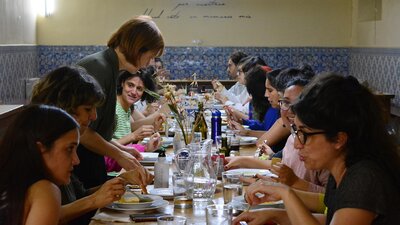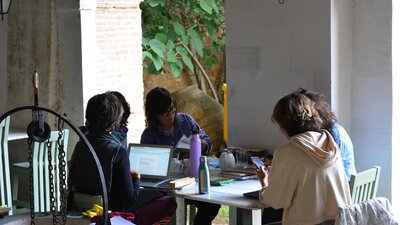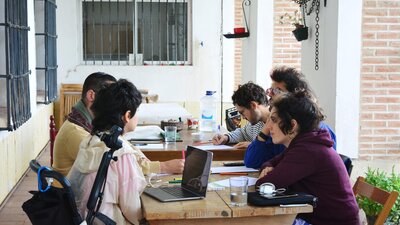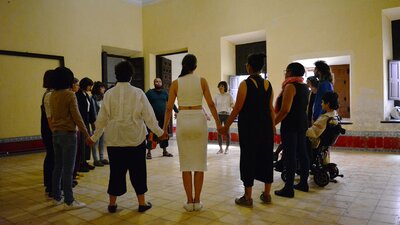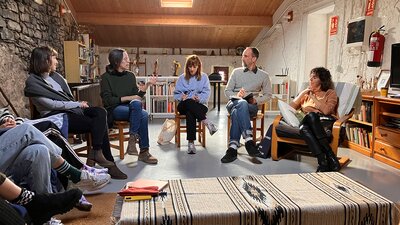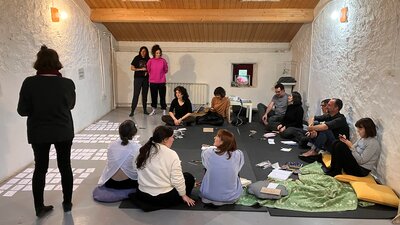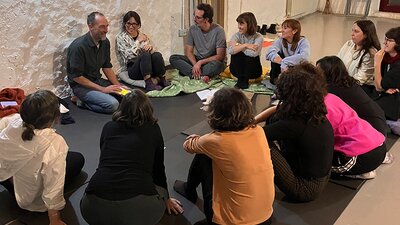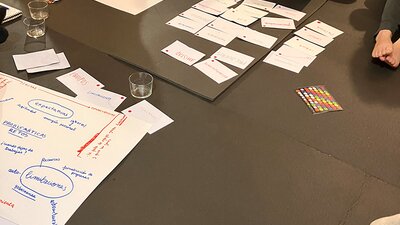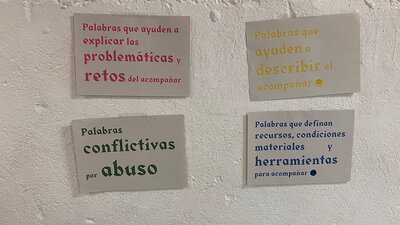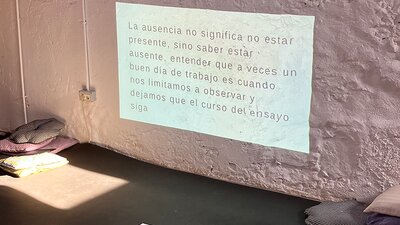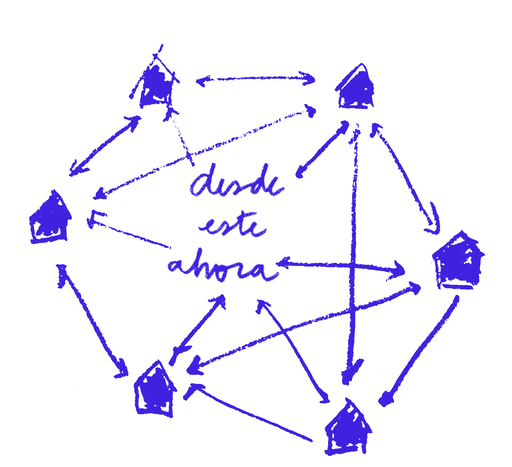
from now on
meetings on infrastructures and work processes of artist residencies
Who goes through a residency and what really happens during this context of 'reflection and immersion'? Who has access to residency programmes and what limitations are there to be part of them? How can we build truly inclusive programmes that address these limitations? What conditions must be in place to put into practice all the theories that we have been sharing and debating in recent years? And finally, who accompanies the people behind these programmes and what working conditions do we propose to be able to develop the work appropriately?
These are some of the questions that cross us and that have made us come together now and from here. From these situated practices and reflections, and through two initial meetings, we have invited artists, researchers and cultural workers to think with us (the three related organisations) and give shape to what is to come. Residencies have become rites of passage, initiatory experiences and almost inescapable requirements for the professionalisation of artists. Now is the time to ask ourselves how, from their conceptualisation and accompaniment, we can work to make them accessible, sustainable and politically active infrastructures in a context of such social and environmental complexity.
The meetings seek to generate spaces for listening, affection and mutual support among all those invited, to involve us in rethinking the functioning of the residences and practising other ways of making them work (from management, care, coexistence and situated research). These reflections and processes will be reflected through the generation of texts or other documents that will serve to share experiences, doubts, good practices, etc., reviewing the existing bibliography and/or expanding it. The aim is not only to generate transversal knowledge, but also to put it into practice in our programmes and to monitor these transformation processes.
meeting 1 - septembre 2023
Monastery of the Immaculate Conception (Loeches, Community of Madrid)
During the first meeting, we started with five working tables organized by themes and energized by people who work from and through the proposed issues. Each table had a live report and visual documentation. The questions we started with were:
Are artistic residencies enabling spaces, why, how can we make the experience of moving out of residence compatible with parenting and other family or affective responsibilities, how can we create structures and initiatives that facilitate the mobility of people who, due to legal circumstances, have greater difficulties in crossing borders? What conflicts -visible or invisible- exist so that diverse peoples and identities participate on equal terms in residency practices? How and from what places of enunciation should these nodes of conflict be addressed and unblocked? How do we face the contradiction of promoting mobility and internalization in a world crossed by ecological collapse?
The tables were hosted by Júlia Ayerbe, Paloma Calle, Ana Bibang, Jo Muñoz and Ane Rodríguez Armendáriz.
The rapporteurs of the same were in charge of: Emma Brasó, Roser Colomar, Alba Feito, and Flavia Introzzi.
The other participants were Christian Fernández Mirón, Ivan Cicchetti, Carlos Almela, Alba Colomo, Gema Sanz, Emma Brasó, Mamen Adeva, Irati Irulegi, Julio Jara, Lenka Holikova, Marcela Rodríguez, Mercedes Álvarez, Sara Martín, Viviana Checchia, María Mallol and José Ramón Hernández.
photographs by Gema Sanz.
meeting 2 - november 2023
Cal Gras (Avinyó, Barcelona)
The second meeting of the laboratory "DESDE ESTE AHORA. Encounters on infrastructures and work processes of artistic residencies", focuses on the processes and conditions of accompaniment in residency programmes and spaces, both in terms of the methodologies of accompaniment, as well as the working conditions and roles of the people who carry out this practice. A meeting centred on the question of accompaniment and the work that those of us who organise, coordinate and make residency programmes possible, thinking both about the processes of accompaniment and the conditions that must be in place for our work and roles to take place.
The work dynamics, proposed by DU-DA, jointly raise our work in this area, asking ourselves what accompaniment processes are or how we think about them, or how we activate visibility programmes, public programmes and specialised visits, or how to collect these methodologies and tools in media (publications, podcasts, reports, etc.), so that they allow us to generate shared knowledge. In addition, we need to think about the working conditions in which this practice is framed, both in terms of resources and teams for accompaniment, what our - scarce - community environments are and how we think the professionalisation of this practice is going. How can we generate support networks and common resources that not only promote good practices but also facilitate their implementation?
A meeting designed to address methodologies, work on naming this practice (glossaries, definitions, concepts that we use to refer to our work, etc.), the lack of teams inherent to the programmes, which means that accompaniments are developed by the same person who carries out the management, communication, and a list of other roles and functions, the lack of support for the creation of accompaniment practices, the need to generate communities/working groups/environments of affinity and professionalisation for people working in programme management and accompaniment the importance of generating possible spaces for work and relations between the artistic/cultural fabric and the social fabric during the accompaniment of a residency, the differentiation or specificities between the programmes of visibility and accompaniment: public programmes, specialised visits, mentoring, the returns (writings, texts, publications, podcasts...) inherent to accompaniments and how they can be materialised within the projects.
Dynamics: DU-DA
Rapporteurship: Itxaso Corral
Participants: Alba Colomo y Alba Feito (La Escocesa), Emma Brasó and Flavia Introzzi (hablarenarte), Irati Irulegi and Roser Colomar (Idensidad), Ane Rodríguez Armendariz, Chiara Cartuccia, Aina Joanet (Nau Ivanow), Pau Cata (CeRC de Investigación y Creación Casamarlès, Platform Harakat, ARRC - Art Residency Research Collective), Eva and Quim (Cal Gras), Ariadna Rodríguez (nyamnyam).
Meetings promoted by Hablarenarte, Idensitat and La Escocesa.


